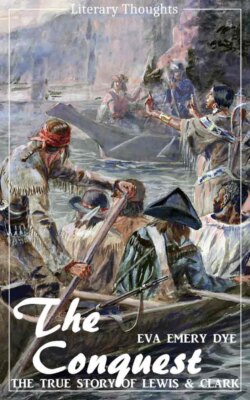Читать книгу The Conquest: The True Story of Lewis and Clark (Eva Emery Dye) - illustrated - (Literary Thoughts Edition) - Eva Emery Dye - Страница 21
На сайте Литреса книга снята с продажи.
Chapter XVI – OLD CHILLICOTHE
ОглавлениеWith a wrench at his hot heart stifled only by wrath and determination, Clark strode from St. Louis. At Cahokia French deserters were talking to Montgomery.
"A tousand British and Indians on te march to Kentucky with cannon."
"When did they start?" thundered Clark. The Frenchman dodged as if shot.
"Dey start same time dis. Colonel Bird to keep Clark busy in Kentucky so Sinclair get San Loui' an' brak up te fur trade."
For once in his life Clark showed alarm. "I know the situation of that country. I shall attempt to get there before Bird does."
Drawing Montgomery aside, he said, "And you, Colonel, chase these retreating Indians. Chase them to Michilimackinac if possible. Destroy their towns and crops, distress them, convince them that we will retaliate and thus deter them from joining the British again."
Without pausing to breathe after the fatigue of the last few days, with a small escort Clark launched a boat and went flying down to Chickasaw Bluffs. Disguised as Indians, feathered and painted, he and a few others left Fort Jefferson.
Clark's army the year before had carried glowing news of Illinois. Already emigration had set in. On the way now he met forty families actually starving because they could not kill buffaloes.
A gun?—it was a part of Clark. He used his rifle-barrelled firelock as he used his hands, his feet, his eyes, instantly, surely, involuntarily. He showed them how to strike the buffalo in a vital part, killed fourteen, and hurried on, thirty miles a day, fording stream and swamp and tangled forest to save Kentucky.
Kentucky was watching for her deliverer. Into his ear was poured the startling tale. With Simon Girty, the renegade, and six hundred Indians, down the high waters of the Miami and up the Licking, Bird came to Ruddle's station and fired his cannon. Down went the wooden palisades like a toy blockhouse before his six-pounders.
"Surrender!" came the summons from Colonel Bird.
"Yes, if we can be prisoners to the British and not to the Indians."
Bird assented. The gates were thrown open. Indians flew like dogs upon the helpless people.
"You promised security," cried Captain Ruddle.
"I cannot stop them," said Bird. "I, too, am in their power."
Madly the Indians sacked the station and killed the cattle. Loading the household goods upon the backs of the unfortunate owners, they drove them forth and gave their cabins to the flames.
The same scenes were enacted at Martin's Station. The Indians were wild for more. But Bird would not permit further devastation. He could easily have taken every fort in Kentucky, not one could have withstood his artillery; but to his honour be it said, he led his forces out.
Loaded with plunder, the wretched captives, four hundred and fifty men, women, and children, were driven away to Detroit. Whoever faltered was tomahawked.
Clark immediately called on the militia of Kentucky. Hastening to Harrodsburg he found the newcomers wild over land entries.
"Land!" they cried, "you can have all you can hold against the Indians."
It was a grewsome joke. The Indians would not even let them survey. Like a military dictator, Clark closed the land office,—"Nor will it be opened again until after this expedition."
Immediately a thousand men enlisted. Logan, Linn, Floyd, Harrod, all followed the banner of Clark. Boone and Kenton set on ahead as guides, into the land they knew so well.
"Is it not dangerous to invade the Shawnee country?" inquired one.
"I was not born in the woods to be scared by an owl," was Clark's sententious reply.
All the provisions they had for twenty-five days was six quarts of parched corn each, except what they got in the Indian country.
Canoeing down the Licking, on the first day of August they crossed the Ohio. Scarce touching shore they heard the scalp halloo. Some fell. Within fifteen minutes Clark had his axes in the forest building a blockhouse for his wounded. On that spot now stands Cincinnati.
On pressed Clark in his retaliatory dash,—before the Shawnees even suspected, the Kentuckians were at Old Chillicothe. They flew to arms, but the Long Knives swooped down with such fury that Simon Girty drew off.
"It is folly to fight such madmen."
Chillicothe went down in flames; Piqua followed; fields, gardens, more than five hundred acres of corn were razed to the level of the sod.
Piqua was Tecumseh's village; again he learned to dread and hate the white man.
"That will keep them at home hunting for a while," remarked Clark, turning back to the future Cincinnati.
